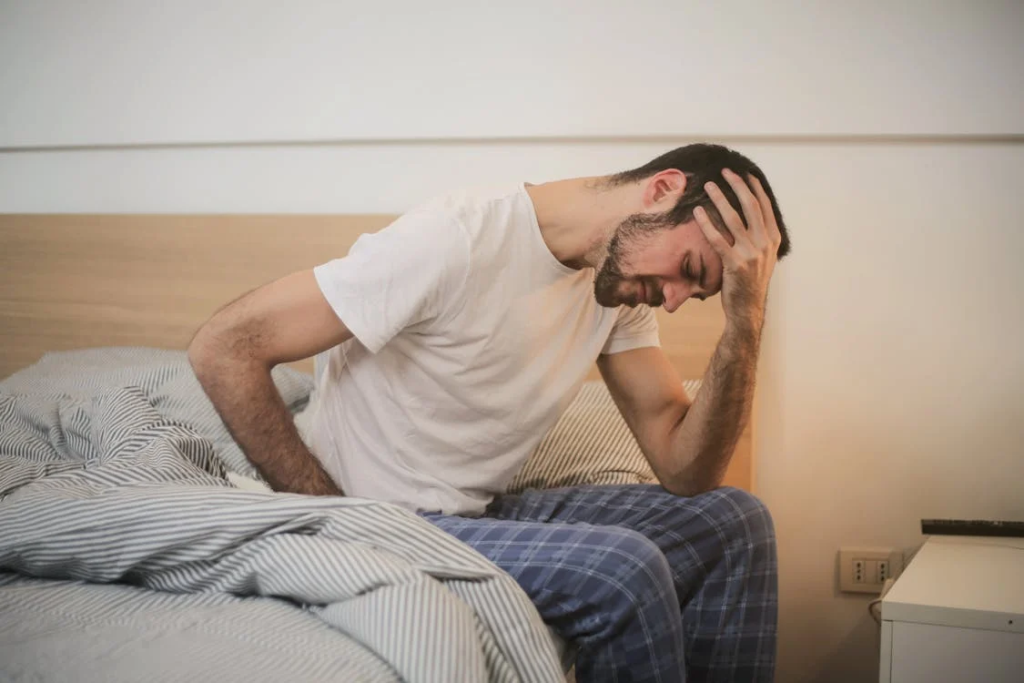When you’re soaking through sheets and feeling bone-tired despite rest, your body might be sending urgent messages that are more alarming than you’d expect. Night sweats and crushing fatigue? They’re common cancer symptoms that just happen to strike at night while you’re sleeping. These experiences don’t guarantee cancer. Most people with these signs have other causes. But recognizing when they shift from normal to concerning can help you get proper care when it counts. These subtle warning signs are frustrating but incredibly important.
Night Sweats That Soak Through Your Sheets

Cancer night sweats aren’t your typical hot flash or summer heat episode. We’re talking about changing soaked pajamas at 3 AM repeatedly. You wake up drenched when your bedroom feels like an icebox. That’s not normal sweating. Medical experts call this sweating severe enough to require complete clothing and sheet changes. These episodes happen without triggers. No thick blankets or spicy late-night snacks. Your body’s hitting the panic button through your sweat glands. Doctors call this hyperhidrosis, but you don’t need fancy terms to recognize something’s wrong. It should be noted that night sweats can occur for various reaons, not just cancer.
Cancer Fatigue Symptoms That Defy Logic

Cancer fatigue doesn’t follow normal rules. We’re not talking about Monday morning sluggishness or post-all-nighter crashes. This is different. Someone yanked your power cord and hid the charger. Cancer specialists see it constantly: overwhelming fatigue that laughs at eight hours of sleep and weekend recovery attempts. Rest doesn’t help, sleep doesn’t help, and your usual recharge methods fail.
Simple tasks become monumental. Showering feels like a marathon, and conversations drain you completely. Your thoughts move through molasses, and your brain feels foggy, like thinking through thick cotton. Medical professionals consistently observe this same difficulty with a focus on patients experiencing such profound exhaustion.
Why Cancer Causes These Symptoms

While these indicators are common in the general population, cancer cells become energy thieves when they do occur. They multiply and grow, stealing resources your body needs for normal functions. Meanwhile, your immune system works overtime fighting back. Everything slows down when you’re running multiple demanding processes.
There’s more happening, though. Cancer triggers inflammation throughout your body, disrupting your hypothalamus. That’s the brain region controlling temperature and sleep cycles. You get a double hit with exhaustion from energy drain, plus temperature chaos from inflammation. Your body’s fighting a war on multiple fronts, and these symptoms reflect that internal battle.
Which Cancers to Know About

Blood cancers like lymphomas top this list, though lung, breast, and other solid tumors can trigger these warning signs too. Lymphomas are especially known for causing what doctors call B symptoms: fever, night sweats, and weight loss that usually show up together. One symptom often leads to another.
What this looks like is a fever that comes and goes for weeks without any infection, night sweats so intense they soak through your clothes, and you lose weight without trying. Another blood cancer worth knowing about is Waldenstrom macroglobulinemia. Despite the intimidating name, it causes many of the same warning signs, plus that overwhelming fatigue we talked about.
When Cancer Symptoms Become Serious

Night sweats and fatigue affect millions of people for harmless reasons. They become worrisome when they happen regularly for weeks without a clear cause. Room temperature doesn’t matter. Season doesn’t matter. They keep happening. For fatigue, here’s the test. Does rest help? Even a little? If not, that’s concerning.
Normal tiredness responds to sleep or addressing obvious stressors. Cancer fatigue laughs at your eight hours and afternoon naps. These are common cancer symptoms that can happen while sleeping, making them particularly disruptive. Oncology experts emphasize not dismissing concerning signs, particularly “new changes in your body’s normal patterns.” You know yourself better than anyone. When something feels off, it probably is. Trust your gut.
Read More: 20 Subtle Cancer Symptoms That Are Commonly Missed by Women and Men
The Critical Timing Factor for Early Detection

More treatment options exist when cancer is caught early. Medical organizations emphasize that “treatment can be more effective when found early,” making symptom recognition crucial for better outcomes. Cancer-related fatigue can appear before treatment even starts, which means these signs emerge while cancer is still highly treatable. The challenge lies in taking vague symptoms seriously when it’s tempting to blame stress, aging, or busy schedules. Dismissing these signs costs precious time. Don’t let “it’s probably nothing” become “Why didn’t I act sooner?”
What Happens During Your Medical Evaluation

Your doctor will ask detailed questions. How often do the night sweats happen? Are they truly drenching? What triggers them? They’re building a picture of what’s happening. For fatigue, expect questions about daily activities. What’s harder now than before? Does rest help at all? The physical exam includes checking lymph nodes, feeling your abdomen for changes, and looking for weight loss. Blood tests reveal cell counts, inflammation markers, and organ function. Don’t worry about seeming dramatic. Doctors would rather investigate normal symptoms than miss something serious.
Your Strategy for Getting the Care You Need

Recognizing the early signs of cancer puts you in control of your health story. Start documenting everything. Keep a simple log of when night sweats happen, how severe they are, and possible triggers. Track your energy levels daily. Note which activities feel particularly draining. Gather your medication list, including supplements and over-the-counter drugs.
Write down recent health changes or life stressors. Don’t minimize what you’re experiencing or wait for symptoms to disappear. Schedule that appointment. Be specific about your concerns. Say something like, “I’m having night sweats that soak my sheets and fatigue that doesn’t improve with rest.” Recognizing the symptoms puts you in control of your health story.
Disclaimer: This information is not intended to be a substitute for professional medical advice, diagnosis or treatment and is for information only. Always seek the advice of your physician or another qualified health provider with any questions about your medical condition and/or current medication. Do not disregard professional medical advice or delay seeking advice or treatment because of something you have read here.
Read More: 5 Prostate Cancer Symptoms Every Man Should Watch For

